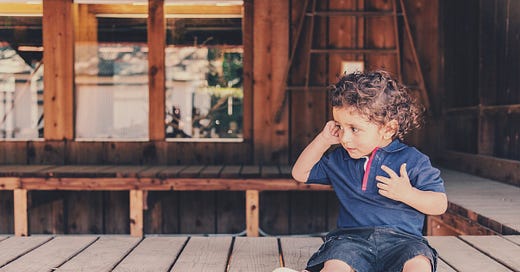In the quaint embrace of our small town, my world revolved around my six-month-old son. He’d embarked on a whirlwind of developmental milestones that became a source of both bewilderment and pride. He got his bottom two teeth, started crawling and hungrily tasted solids like a champ. I was a new mom, so anything new scared me at first—even good things—and I often called the doctor to ask, Is this normal? But slowly, I began to feel proud of him—and of myself, secretly, too.
Navigating this adventure alone, miles away from my mother and our extended family, presented its own set of challenges. With my husband engrossed in his full-day work commitments, I found solace in the bond I shared with my son. As a new mom, doubt creeps in often. In moments of uncertainty, I turned to the only confidante I had in our close-knit community: a fellow mom, Anna, whose son was just a couple of months older than mine.
Our paths had serendipitously crossed at an office party as our husbands worked in the same lab. This friendship had become my lifeline. She, too, had experienced the trials and triumphs of new motherhood, and her wisdom became my compass. In the absence of nearby family, she filled the void with invaluable advice.
As the pages of our motherhood journey unfolded, I couldn't help but notice the subtle dance of milestones between our sons. When she shared the news that her son had begun crawling, I couldn't help but beam with pride. My son, too, had been showing the telltale signs of imminent mobility. As her son uttered the sweetest word, Mama, my heart swelled with joy, knowing that my son had already graced us with those precious syllables and a few others.
However, when the topic of walking arose, a shadow of concern crept over my thoughts. While Anna’s son confidently took his first steps, mine seemed content with standing but showed no inclination to take that monumental stride.
Winter, with its frosty embrace, drew us four closer with regular playdates. It was during one of these evenings that the gap between our sons' progress became more apparent. She shared a charming anecdote about her son pointing at things and offering delightful answers. I listened with a smile, but behind it, a flicker of worry ignited. My son, though expressive in his own ways, hadn't yet shown signs of such gestures. The worry took residence in my thoughts, and with each passing day, its flame grew hotter.
I decided to channel that concern into action, spending even more time with my son. Determined to bridge the developmental gap, I pointed to his nose and reminded him that it was his nose. One simple question—Where is your nose?—became a daily refrain, repeated a dozen times in the hope of a response.
But my son remained quiet. As the two-month window for catch-up slowly closed in, my disappointment loomed. The worry, now a constant companion, cast a cloud of ash over our playdates and shared moments.
On one such playdate, I found myself caught in a whirlwind of conflicting emotions. Her son, seemingly propelled by a growth spurt, dazzled us with a repertoire of new skills, leaving me grappling with a twinge of sadness and an undercurrent of jealousy that I struggled to conceal. In the quiet recesses of my mind, I yearned to ask my toddler, Why won't you tell me where your fucking nose is?
The fatigue of the day settled as my son and I slouched on the sofa, seeking respite. I took a sip of water, and in a surprising twist of fate, my son grabbed the empty glass from my hand and uttered three unrecognizable syllables. It was a whimsical game we had concocted. My son had understood that he could change his voice by speaking into a glass. During our playful moments, I would take the glass to my mouth and express, "I love you," and in response, he would take his turn, producing three adorable (if not-yet-quite-sensical) syllables.
Anna, witnessing this charming interaction, couldn't help but express her delight. She immediately grabbed a glass and said, “I love you” to her son and handed the glass to him, eagerly anticipating a similar display of endearing mimicry. However, her little one simply dropped the glass.
Instead of frustration or disappointment, Anna responded with a heartfelt acknowledgment of the need for practice. Her genuine acceptance of the situation left me momentarily speechless. In that instant, I realized the beauty of embracing the learning process, even in the simplest of moments.
My son, in his innocent mimicry of our whimsical glass game, was simply doing what I had taught him organically. It dawned on me that kids absorb and assimilate not through formal teaching, but by observing and engaging in play.
The weight of this understanding settled on my shoulders, prompting me to reconsider my approach. I couldn't spend every waking moment in play, abruptly interrogating my son on the whereabouts of his nose and eyes for mere seconds. Instead, I needed to seamlessly weave these lessons into our daily interactions, making learning an integral part of our shared playtime.
A humbling realization hit me, revealing a rookie mistake veiled in the clichéd trap of comparison. My husband and I had consciously decided not to measure our baby's progress against others’—not now, not ever. Yet, in the whirlwind of parenthood, we sometimes stumble without realizing it. Despite my best efforts to the contrary, I had fallen into the comparison trap, causing unnecessary stress and silent discontent.
Acknowledging this misstep brought a sense of relief. I recognized the importance of staying true to our initial commitment to let our son unfold at his own pace. The awareness of this oversight prompted a subtle shift in perspective.
So what if he didn't yet comprehend the concept of his nose? He knew how to breathe with it, and that was the most important thing for me.






I appreciate the honesty in this essay. It’s a common feeling we don’t often talk about.